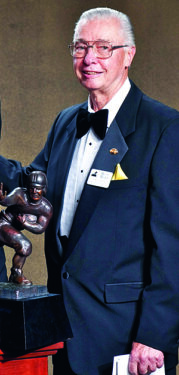Rudy Riska, the longtime executive director of the Heisman Trophy, died on Sept. 12 at age 85.
Even the most passionate college football fans might not know the name, but for those involved with the presentation of the Heisman — especially the winners — Riska’s name became synonymous with the annual ceremony.

Up until his death, Riska had been a parishioner at Our Lady of Angels, Bay Ridge, for more than 50 years. During that stretch, he enjoyed one of the most exciting — and one of the most important — jobs in college football.
“Rudy is the glue that has kept the Heisman Trophy together,” said 1963 Heisman Trophy winner and legendary NFL quarterback Roger Staubach. “He is the link that keeps all the winners together. He is a great guy with a tremendous respect for the Heisman Trophy and what it stands for.”
As if his career were truly meant to be, Riska was born in 1936 across the street from the Downtown Athletic Club, the site of the Heisman Trophy presentation for many years. That same year, the man for whom the trophy was named — John W. Heisman — passed away.
A talented high school athlete at Metropolitan H.S., Riska pitched five seasons of minor league baseball for the New York Yankees and Baltimore Orioles. However, an arm injury cut his career short, and he then took a job as a sporting goods salesman for Rawlings.
His boss notified him of an opening as a part-time athletic trainer at the Downtown Athletic Club, and from there, his career blossomed. The club’s board of directors wanted him to change the culture of the club from more of an eating establishment to an athletic facility.
Inspired by an event in which he met St. Louis Cardinals slugger Stan Musial, Riska began creating monthly events in which fans could interact with their favorite sports heroes. He welcomed such famous athletes as Muhammad Ali, Bob Cousy, Oscar Robertson, and the living members of the Brooklyn Dodgers.
During his tenure as the club’s athletic director, Riska transformed the Heisman ceremony. It went from being barely a two-day affair to a full four-day event including a television special and Heisman dinner/dance.
Riska ensured that all details of the ceremony — from the winner’s acceptance speech to his tuxedo rental — were accounted for. He also gave the winner some much-needed advice heading into the fanfare Heisman weekend.
Though his work was mostly behind the scenes, the fruits of his labor paid off with a seamless ceremony in which the winner could fully bask in the glory of college football’s highest honor without having to worry about all the logistics that go along with the prestigious award.
As a lover of sports, Riska realized that he had the best job in the world. He often would tell people how fortunate he was to be able to have a lifetime career where he could pursue his passion.
“What made the job so good was that I was in sports my whole life,” said Riska, who retired in 2003 after more than 50 years with the club as the executive director of both The Heisman Trophy Trust and The Heisman Foundation, which has raised more than $1 million for various foundations and charitable organizations across the country.
Riska is survived by his wife of almost 60 years, Lorraine; his two daughters, Elizabeth and Barbara; and four grandchildren, Brian, Emma, Jessica, and Kristin.
Tim Henning, the associate director of The Heisman Trophy Trust and a parishioner at St. Francis de Sales, Belle Harbor, shared a small office with Riska after the Downtown Athletic Club was damaged in the 9/11 attacks. He said words cannot adequately express the impact that Riska had on the Heisman Trophy and the fraternity of Heisman winners and friends.
“I learned more from him (Riska) during that time than any textbook or professor could ever have taught me,” said Henning, also a member of the St. Francis de Sales Parish Council and fundraising committee. “Rudy consistently took a keen interest in others. He was a just man. He treasured relationships and treated people equally with kindness and respect, regardless of their supposed status in society.
“The prestige that the Heisman Trophy currently garners is undoubtedly a direct result of Rudy shepherding it for over five decades. The Heisman family is truly indebted to him.”
Riska will surely be missed, yet his legacy as one of the most influential people in college football will live on — especially when each new winner is awarded the Heisman.
Contact Jim Mancari via email at jmmanc@gmail.com.
